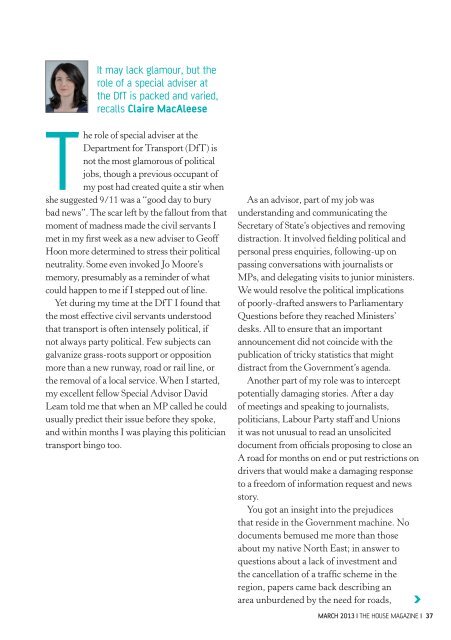Department
Department
Department
Create successful ePaper yourself
Turn your PDF publications into a flip-book with our unique Google optimized e-Paper software.
It may lack glamour, but the<br />
role of a special adviser at<br />
the DfT is packed and varied,<br />
recalls Claire MacAleese<br />
The role of special adviser at the<br />
<strong>Department</strong> for Transport (DfT) is<br />
not the most glamorous of political<br />
jobs, though a previous occupant of<br />
my post had created quite a stir when<br />
she suggested 9/11 was a “good day to bury<br />
bad news”. The scar left by the fallout from that<br />
moment of madness made the civil servants I<br />
met in my first week as a new adviser to Geoff<br />
Hoon more determined to stress their political<br />
neutrality. Some even invoked Jo Moore’s<br />
memory, presumably as a reminder of what<br />
could happen to me if I stepped out of line.<br />
Yet during my time at the DfT I found that<br />
the most effective civil servants understood<br />
that transport is often intensely political, if<br />
not always party political. Few subjects can<br />
galvanize grass-roots support or opposition<br />
more than a new runway, road or rail line, or<br />
the removal of a local service. When I started,<br />
my excellent fellow Special Advisor David<br />
Leam told me that when an MP called he could<br />
usually predict their issue before they spoke,<br />
and within months I was playing this politician<br />
transport bingo too.<br />
As an advisor, part of my job was<br />
understanding and communicating the<br />
Secretary of State’s objectives and removing<br />
distraction. It involved fielding political and<br />
personal press enquiries, following-up on<br />
passing conversations with journalists or<br />
MPs, and delegating visits to junior ministers.<br />
We would resolve the political implications<br />
of poorly-drafted answers to Parliamentary<br />
Questions before they reached Ministers’<br />
desks. All to ensure that an important<br />
announcement did not coincide with the<br />
publication of tricky statistics that might<br />
distract from the Government’s agenda.<br />
Another part of my role was to intercept<br />
potentially damaging stories. After a day<br />
of meetings and speaking to journalists,<br />
politicians, Labour Party staff and Unions<br />
it was not unusual to read an unsolicited<br />
document from officials proposing to close an<br />
A road for months on end or put restrictions on<br />
drivers that would make a damaging response<br />
to a freedom of information request and news<br />
story.<br />
You got an insight into the prejudices<br />
that reside in the Government machine. No<br />
documents bemused me more than those<br />
about my native North East; in answer to<br />
questions about a lack of investment and<br />
the cancellation of a traffic scheme in the<br />
region, papers came back describing an<br />
area unburdened by the need for roads,<br />
March 2013 | THE HOUSE MAGAZINE | 37


